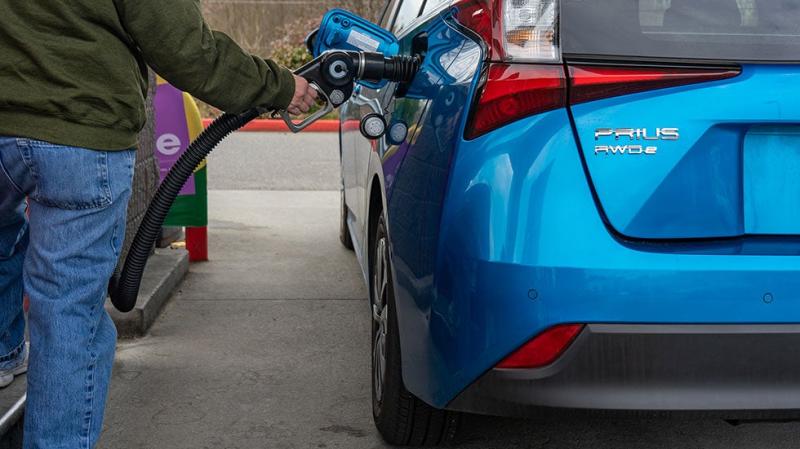Biden's Paris Agreement commitment will be tough on Americans — and ineffective
By: Ellen R. Wald (TheHill)


We are currently on the path to failure simply because we want it all. Joe Biden pushing the rope isn't going to work. Cutting a foot off the bottom of the rope and tying it to the top won't make a longer rope. The problem is we're running out of rope.
While Joe Biden is making political promises to other countries based on magical thinking requiring technological marvels, Biden completely ignores what those promises made to other countries mean for the people Biden claims to represent. Joe Biden is not trying to score political points on the world stage by benefiting the United States. Joe Biden is making promises that he expects the American people to keep; none of these promises will cost Joe Biden anything.
Climate change is a self solving problem. We can continue our over consumption of energy and resources, we can rely on magical thinking, until conditions become so severe that the pandemic will look like a garden party. That really is a viable option. We need to open our eyes and accept the fact that Joe Biden has promised magic that allows us to continue partying while the world burns. Joe Biden is putting us on the path that allows climate change to solve itself. And climate change will solve itself; nature is not compassionate or benevolent.
The COP21 Paris accord was a showpiece of political ineptitude and complacency concerning the environment. The Paris agreement was all about the money. Governments are expecting to make a lot of money off of climate change. But they're only fiddling while the world burns.

In April, President Biden announced that the United States will commit to reducing its greenhouse gas (GHG) emissions over the next eight years to about 50 percent of what they were in 2005. This commitment is formalized as America's nationally determined contribution (NDC), which is a public declaration required of the Paris Agreement signatory nations. But have the American people had a chance to see what this plan means for them?
First, looking at data from the 2021 Annual Energy Outlook from the Department of Energy, we would need to increase the number of electric vehicles (EVs) on the road from 0.3 percent to 50 percent. This means nearly every new car and light-duty truck sold in the next eight years would have to be electric, as opposed to an internal combustion engine. We don't have access to the raw materials to build so many batteries and our power grids are insufficient to charge all these vehicles. Not to mention that EVs are unaffordable and lack the range to be practical for many Americans.
Second, to meet the NDC, half of all residential buildings and half of all commercial buildings that are currently heated with natural gas, heating oil and propane would need to be converted to electric heat. The commercial side of this requirement alone amounts to 1.4 million buildings. In the northern parts of the country, forced air heat, even from the newest air source heat pumps, is insufficient to reliably heat a house. And again, this would only add strain to the power grids — along with the 100 million plus new EVs — as these grids are forced to jettison their reliance on coal.
Third, all power generation from coal would need to be shut down. Currently, the U.S. only generates about 19.3 percent of its electricity from coal, but some areas of the U.S. rely more heavily on coal than others. For example, there are periods when West Virginia, Minnesota and Pennsylvania generate half of their electricity by burning coal.
Fourth, the NDC would require the U.S. to transition 80 percent of its electricity generation to zero-emitting renewables. For comparison, renewables including hydropower currently make up 17 percent of all electricity generated in the United States. This kind of transition is impossible to make in the next eight years, all while maintaining Americans' current standard of living. It is impossible to construct a single nuclear power plant or large hydroelectric dam on time to comply with this commitment.
These goals cannot possibly be met without major sacrifices for Americans. Some might argue that sacrifices should be made to help the climate. However, this NDC still would make no noticeable impact on global GHG emissions because the real problem comes from countries such as China, Russia and India. According to the U.N. Emissions Gap Report, the U.S. has been decreasing its GHG emissions per capita for two decades — even without the Paris Agreement — while those three major economies are still increasing theirs.
The earth's climate doesn't care which country is emitting GHGs. While the United States has been closing coal power plants and transitioning to cleaner natural gas, China is building more coal power plants. In 2020, China brought on line 38.4 gigawatts of new coal-fired power and currently has another 247 gigawatts of coal power under development. China has pledged to reach peak emissions by 2030 (the same year the U.S. has committed to cutting its emissions by half) and to achieve "net zero" by 2060. But China has yet to issue an NDC, publicly outlining and committing to any targets. In fact, it seems clear that China has no intention of changing its emissions behavior at all. A top Chinese diplomat recently admitted in an interview that it is unrealistic to expect that China will do anything more to reduce its GHG emissions.
It is understandable that countries with large amounts of poverty, such as China and India, want to take advantage of their natural resources to increase the standard of living for their people. But for the sake of the planet, the United States would do better using considerable resources to help these countries reduce their dependence on coal, rather setting unattainable goals at home. For example, instead of using its money to subsidize or mandate the consumption of electric vehicles for Americans — a move that would barely impact global GHG emissions — the U.S. could facilitate the export of plentiful American natural gas to China and India to help reduce their dependence on coal.
The planet would be better served by truly global cooperative efforts because the current American plan is impossible, unrealistic and insufficient.
Ellen R. Wald is a senior fellow at the Atlantic Council's Global Energy Center, and president of Transversal Consulting, a global energy and geopolitics consultancy. She is the author of "Saudi, Inc.," a history of Aramco and how the Saudi royal family controls this multitrillion-dollar enterprise. Follow her on Twitter @EnergzdEconomy.






Consume less, spend less, pollute less. What's so difficult to understand?
Hoping that technology will magically solve the problem while we continue partying is only magical thinking. That's not hoping for the best and planning for the worst. That's only ignoring the worst. Eventually the worst becomes inevitable.
Do you have a percentage in mind?
If we allow climate change to solve itself then the percentage becomes 100.
As the seeded article points out, sustaining our current (and increasing) energy consumption by switching technology will require a drastic increase in development and use of natural resources. We're going to be required to drastically increase our energy consumption to make the transition to the new magical technology. And trying to produce the magical new technology cheaply will very likely increase our greenhouse gas emissions. But a few people will make a lot of money.
The pandemic should have provided insights into where and how much we can reduce our energy consumption. If we allow climate change to solve itself the restrictions will be imposed by nature, not government, and will be far harsher than any government restrictions.
Until overpopulation is addressed the problem will continue
we should do our part. I can think of at least 50 million knuckle draggers in america we could shed without ill effect, but it would require a very large hole in the desert. /s
Over population doesn't explain why a country that imports so much has such a large carbon footprint. Why should the services economy of the United States be emitting so much greenhouse gas?
Americans are the world's biggest consumers.
Yes, it does actually. The larger the population, the greater the amount of resources it consumes and wastes.
Because people consume and they're not as careful about resource use or conservation.
If Americans aren't at the top then we're pretty darned close.
When to we begin accepting that climate change is a consumption problem?
Will promising that we can continue to consume and waste as we are now by changing energy sources really a solution?
At some point it's going to become glaringly obvious that the political approach to addressing climate change has really been about saving a global economy that was built upon fossil fuels. The myopic belief that we can replace the foundation without causing the whole thing to collapse is magical thinking.
Why wouldn't alternative energy require an alternative economy, too?
Changing energy sources will (hopefully) reduce waste and pollution. But by itself it is not a solution. Overall reduction in consumption, waste, and population, coupled with cleaner fuels and more efficient technologies will offer a better solution.
Any change will be gradual, so the overall impact will be mitigated. It's not like we're suddenly going to abandon fossil fuel use and switch to alternatives the world over tomorrow.
The economy will adapt as alternatives are introduced and become increasingly prevalent. We see that happening now with electric vehicles on the market. I'm not sure what you have in mind as to what will happen. But it seems you think it's going to be a sudden extreme.
It's a consumption and population problem.
Like it or not, change is gonna come...
Yes, but as we know, there are some who are quite resistant to change. In any form for that matter.